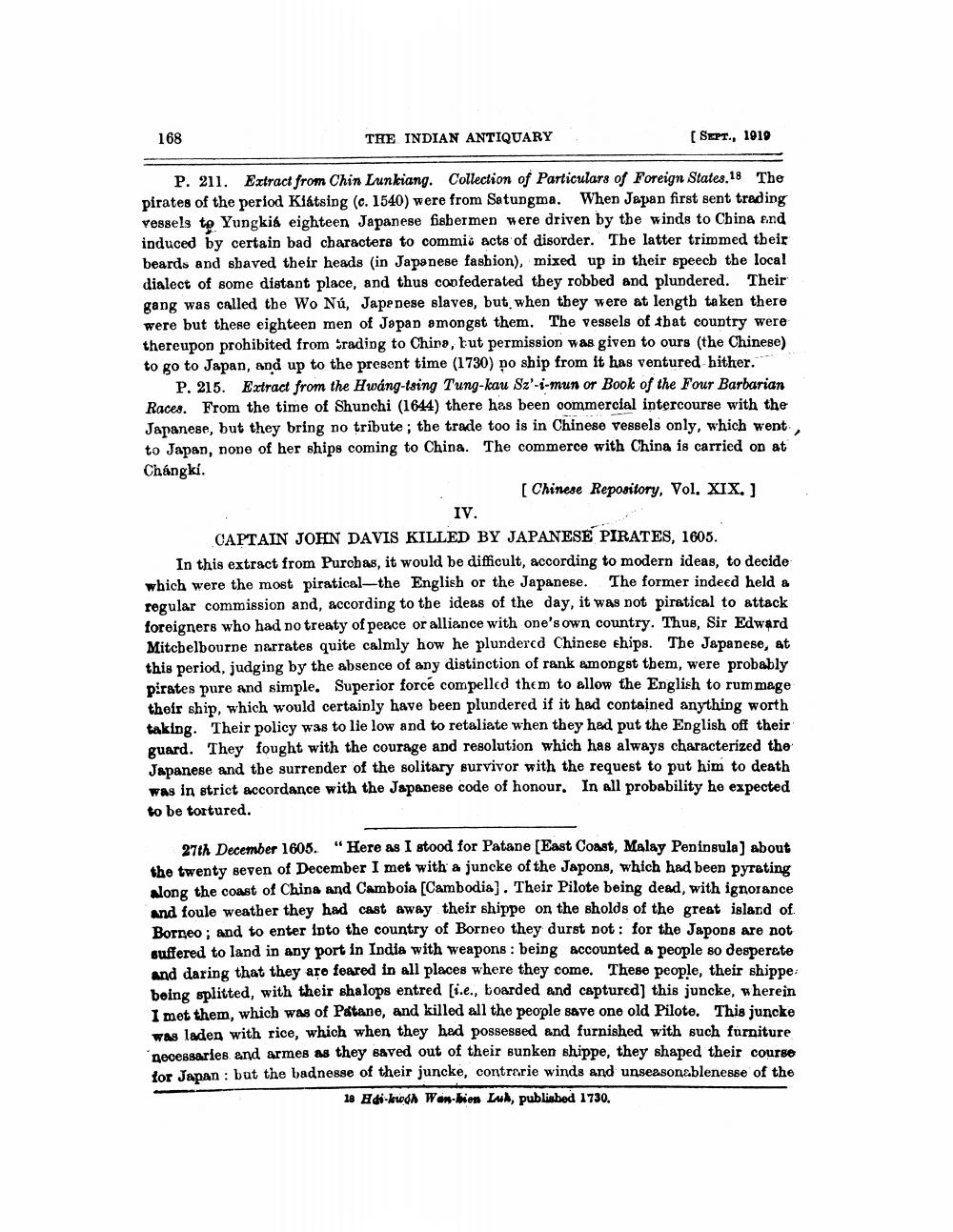________________
168
THE INDIAN ANTIQUARY
(SEPT., 1910
P. 211. Extract from Chin Lunkiang. Collection of Particulars of Foreign States.18 The pirates of the period Kiátsing (c. 1540) were from Satungma.When Japan first sent trading vessels to Yungkis eighteen Japanese fishermen were driven by the winds to China end induced by certain bad characters to commiü acts of disorder. The latter trimmed their beards and shaved their heads (in Japanese fashion), mixed up in their speech the local dialect of some distant place, and thus confederated they robbed and plundered. Their gang was called the Wo Nú, Jape nese slaves, but when they were at length taken there were but these eighteen men of Japan amongst them. The vessels of that country were thereupon prohibited from trading to China, but permission was given to ours (the Chinese) to go to Japan, and up to the present time (1730) po ship from it has ventured hither.
P. 215. Extract from the Hwang-tsing Tung-kau Sz'--mun or Book of the Four Barbarian Races. From the time of Shunchi (1644) there has been commercial intercourse with the Japanese, but they bring no tribute; the trade too is in Chinese vessels only, which went to Japan, none of her ships coming to China. The commerce with China is carried on at Cháng kí.
Chinese Repository, Vol. XIX. ]
IV. CAPTAIN JOHN DAVIS KILLED BY JAPANESE PIRATES, 1605. In this extract from Purchas, it would be difficult, according to modern ideas, to decide which were the most piratical--the English or the Japanese. The former indeed held & regular commission and, according to the ideas of the day, it was not piratical to attack foreigners who had no treaty of peace or alliance with one's own country. Thus, Sir Edward Mitcbelbourne narrates quite calmly how he plundered Chinese chips. The Japanese, at this period, judging by the absence of any distinction of rank amongst them, were probably pirates pure and simple, Superior force compelled them to allow the English to rummage their ship, which would certainly have been plundered if it had contained anything worth taking. Their policy was to lie low and to retaliate when they had put the English off their guard. They fought with the courage and resolution which has always characterized the Japanese and the surrender of the solitary survivor with the request to put him to death was in strict accordance with the Japanese code of honour. In all probability he expected to be tortured.
27th December 1605. "Here as I stood for Patane (East Coast, Malay Peninsula) about the twenty seven of December I met with a juncke of the Japons, which had been pyrating along the coast of China and Camboia (Cambodia). Their Pilote being dead, with ignorance And foule weather they had cast away their shippe on the sholds of the great island of Borneo; and to enter into the country of Borneo they durst not: for the Japons are not suffered to land in any port in India with weapons : being accounted a people so desperate and daring that they are feared in all places where they come. These people, their shippe. being splitted, with their shalops entred (i.e., boarded and captured) this juncke, wherein I met them, which was of Patane, and killed all the people save one old Pilote. This juncke was laden with rice, which when they had possessed and furnished with such furniture Decessaries and armes as they saved out of their sunken shippe, they shaped their course for Japan : but the badnesse of their juncke, contrarie winds and unseasonablenesse of the
18 Hdi-kwoh Wan-brien Luh, published 1730.




